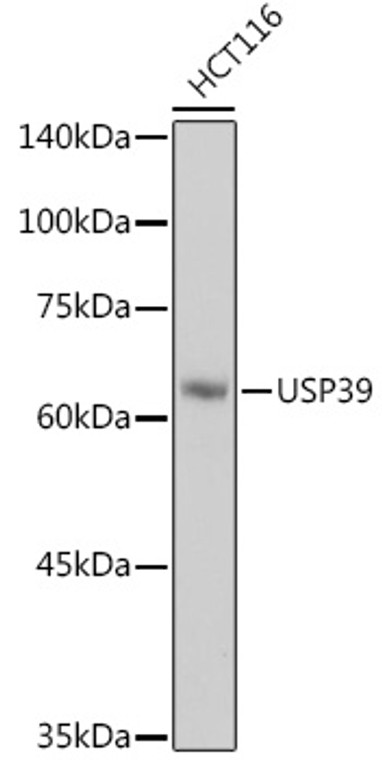| Host: |
Rabbit |
| Applications: |
WB/IHC |
| Reactivity: |
Human/Rat |
| Note: |
STRICTLY FOR FURTHER SCIENTIFIC RESEARCH USE ONLY (RUO). MUST NOT TO BE USED IN DIAGNOSTIC OR THERAPEUTIC APPLICATIONS. |
| Short Description: |
Rabbit monoclonal antibody anti-USP39 (200-300) is suitable for use in Western Blot and Immunohistochemistry research applications. |
| Clonality: |
Monoclonal |
| Clone ID: |
S7MR |
| Conjugation: |
Unconjugated |
| Isotype: |
IgG |
| Formulation: |
PBS with 0.02% Sodium Azide, 0.05% BSA, 50% Glycerol, pH7.3. |
| Purification: |
Affinity purification |
| Dilution Range: |
WB 1:500-1:1000IHC-P 1:50-1:200 |
| Storage Instruction: |
Store at-20°C for up to 1 year from the date of receipt, and avoid repeat freeze-thaw cycles. |
| Gene Symbol: |
USP39 |
| Gene ID: |
10713 |
| Uniprot ID: |
UBP39_HUMAN |
| Immunogen Region: |
200-300 |
| Immunogen: |
A synthetic peptide corresponding to a sequence within amino acids 200-300 of human USP39 (Q53GS9). |
| Immunogen Sequence: |
QQIANLDKQAKLSRAYDGTT YLPGIVGLNNIKANDYANAV LQALSNVPPLRNYFLEEDNY KNIKRPPGDIMFLLVQRFGE LMRKLWNPRNFKAHVSPHEM L |
| Function | Deubiquitinating enzyme that plays a role in many cellular processes including cellular antiviral response, epithelial morphogenesis, DNA repair or B-cell development. Plays a role in pre-mRNA splicing as a component of the U4/U6-U5 tri-snRNP, one of the building blocks of the precatalytic spliceosome. Specifically regulates immunoglobulin gene rearrangement in a spliceosome-dependent manner, which involves modulating chromatin interactions at the Igh locus and therefore plays an essential role in B-cell development. Regulates AURKB mRNA levels, and thereby plays a role in cytokinesis and in the spindle checkpoint. Regulates apoptosis and G2/M cell cycle checkpoint in response to DNA damage by deubiquitinating and stabilizing CHK2. Plays also an important role in DNA repair by controlling the recruitment of XRCC4/LIG4 to DNA double-strand breaks for non-homologous end-joining repair. Participates in antiviral activity by affecting the type I IFN signaling by stabilizing STAT1 and decreasing its 'Lys-6'-linked ubiquitination. Contributes to non-canonical Wnt signaling during epidermal differentiation. Acts as a negative regulator NF-kappa-B activation through deubiquitination of 'Lys-48'-linked ubiquitination of NFKBIA. |
| Protein Name | Ubiquitin Carboxyl-Terminal Hydrolase 39Sad1 HomologU4/U6.U5 Tri-Snrnp-Associated 65 Kda Protein |
| Database Links | Reactome: R-HSA-72163 |
| Cellular Localisation | Nucleus |
| Alternative Antibody Names | Anti-Ubiquitin Carboxyl-Terminal Hydrolase 39 antibodyAnti-Sad1 Homolog antibodyAnti-U4/U6.U5 Tri-Snrnp-Associated 65 Kda Protein antibodyAnti-USP39 antibodyAnti-CGI-21 antibodyAnti-HSPC332 antibodyAnti-PRO2855 antibody |
Information sourced from Uniprot.org
12 months for antibodies. 6 months for ELISA Kits. Please see website T&Cs for further guidance









